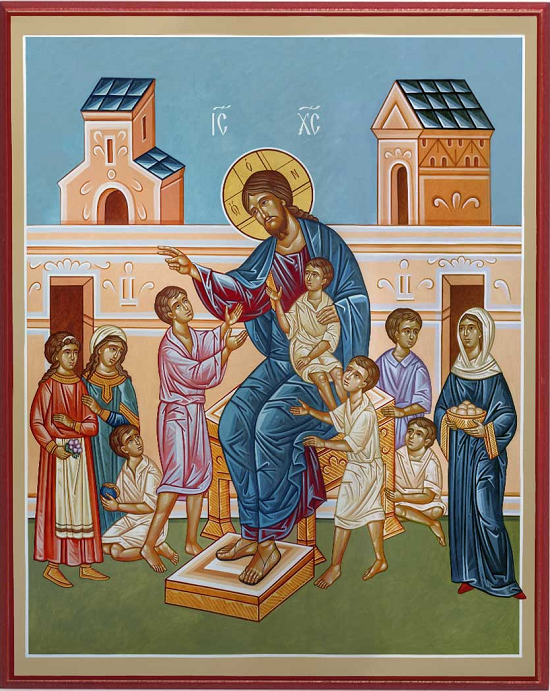Adjusting Our Focus
Thirteenth Sunday Scripture Readings

The three readings that were selected to make up today’s liturgy seem almost to have been chosen at random. It’s a challenge to find a theme or concept that could link them all together. And even Jesus’s quotes that Matthew provides for us in the gospel reading are not easily understandable. “Whoever loves mother and father more than me is not worthy of me,” the gospel says. Are we not commanded to love our parents? My take on the readings is that they’re trying to provide us with a focus. To see what I mean by that, let’s start with just one sentence out of today’s gospel.
Matthew quotes Jesus as saying, “Whoever finds his life will lose it, and whoever loses his life will find it.” We might think, from the way this sentence is presented here, that Jesus is encouraging his disciples to court death. Nothing could be further from the real meaning. The Greek word that Matthew uses here is ψυχη (psuche), from which we get our terms psyche, psychology, and psychiatrist. It can mean “soul,” or “life,” or even “self.” In this passage, many commentators believe that “self” would be a better translation than “life.” Doesn’t it make better sense to say, “Whoever finds themselves will lose them, and whoever loses themselves will find them”?
In that context, Jesus is warning his disciples against excessive self-interest. Isn’t that our experience? Aren’t people who are obsessed with “finding themselves” insufferable? What worse excuse for immature or bad behavior could anyone come up with than to say, “Oh, they’re just finding themselves” or “They just haven’t found themselves yet.” Although we know what they mean, since when is that a valid excuse for anything?
In today’s gospel passage, Jesus is talking about our preferences which, when we look more closely at them, are actually our values. Jesus uses the example of the family—father and mother, brother and sister—as a symbol of all the value attachments that hold us back from growing and maturing. These are all the things we cling to out of the fear of losing out if we were to let them go. Certainly, Jesus did not mean that we should turn our backs on our families. But he warns us not to let the fear of the loss of anything—even our families—keep us from reaching out to others. We’re not going to find ourselves by clinging to everything we find safe and non-threatening. Jesus challenges us to “take up [our] cross”—to face the fear of the unknown—and to follow after him.
To follow after Jesus is to embrace uncertainty. A couple of weeks ago, I was in Nazareth, looking down from a hillside onto the Sea of Galilee. Of the many spiritual experiences I had while I was traveling, this one stands out. I said to myself, “This is where it all happened. This is where Peter, James, and John left their families and livelihoods behind to follow Jesus.” They chose the unknown over the known and, because of that choice, I had come halfway around the world just to stand there.
What does the uncertainty we’re challenged to embrace look like? The second paragraph of the gospel gives us some suggestions. It’s fine to say that the disciple needs to turn from selfish comfort and security, but what are we being called to turn to? He promises that we will receive him and receive his Father to the extent that we receive one another. “He who receives you receives me.” Who are we? We are all prophets. We are all righteous people. We are all his little ones, even when we don’t look like it. Especially when we don’t look like it. Yet, we find ourselves when we offer one another as little as a cup of cold water to drink. We find our true selves by losing ourselves in the service of others, as the woman in the first reading gave of herself to provide for the prophet Elisha. As Paul wrote in his letter to the Roman Church, “we were baptized into Christ’s death”—his death to self-centered self-interest—“that we too might live in newness of life”—life in the service of one another.
I said that I thought today’s readings were all about adjusting our focus. Jesus invites us to shift our focus from inward to outward, from childish concern about what’s going to happen to me and what am I going to get in return for my trouble to a mature concern for the welfare of others and what I might bring to them in God’s name. I almost said, “…what I might bring to those in need,” but I stopped myself. I changed my mind because we are all in need—every one of us. We are all dependent on the kindness of others. And, if we don’t bring the loving-kindness of our God to others, who will? “Jesus said to his apostles”—to those he sent to bring the good news to the world, that is, to us—“whoever receives you, receives me, and whoever receives me receives the one who sent me.” Focus on bringing Christ’s loving-kindness into your world and, “…amen, I say to you, [you] will surely not lose [your] reward.”
Get articles from H. Les Brown delivered to your email inbox.
